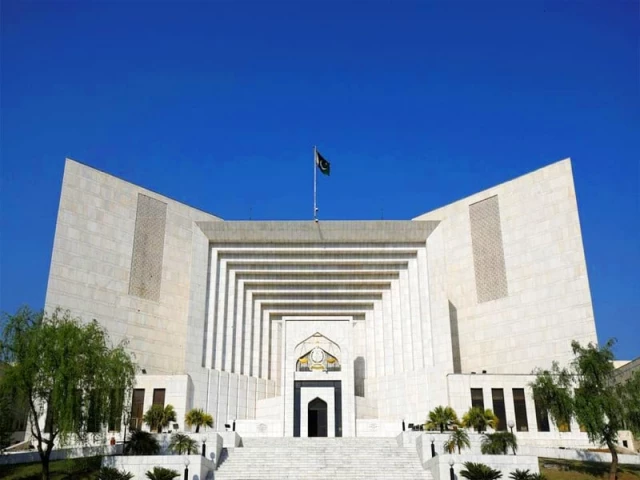Executive's grip on judiciary tightens
The appointment of seven Supreme Court judges under Chief Justice of Pakistan (CJP) Yahya Afridi has sparked concerns

The appointment of seven Supreme Court judges under Chief Justice of Pakistan (CJP) Yahya Afridi has sparked concerns that the superior judiciary has fallen under complete executive influence.
Former senator Mustafa Nawaz Khokhar raised alarms over the process, saying that as a string of recent events rocks the judiciary, the appointments have hammered the final nail in the coffin of its credibility.
"Our judiciary's record is nothing to shout home about but in the manner these new appointments were carried out without first hearing the petitions challenging the very process of selection has robbed the institution of any last remaining bits of credibility," he lamented.
He noted that amid the testing times, where freedom of expression through PECA has been curtailed, politics has been reduced to subservience and independence of the judiciary has been compromised, one would have expected CJ Afridi to have played a more proactive role.
Despite facing resistance from some fellow judges, CJP Afridi, as chairman of the Judicial Commission of Pakistan (JCP), has appointed 43 judges to superior courts, including the transfer of three judges from other high courts to the Islamabad High Court (IHC).
The scale of these appointments during a single chief justice's short tenure is unprecedented.
It is widely acknowledged that had CJP Afridi resisted, it would have been difficult for the government to induct judges aligned with its interests into the superior judiciary. However, there is a growing perception that he facilitated the government following the 26th constitutional amendment.
Rather than convening a full court in line with the majority decision of the committee, CJP Afridi summoned a JCP meeting in November to consider Supreme Court judges for the constitutional bench. The government successfully secured the appointment of a judge aligned with its stance as the head of the constitutional bench.
Subsequently, without waiting for a final decision on the 26th Amendment, CJP Afridi invited nominations for judges of the high courts and Supreme Court. At every step, he refrained from dampening the executive's expectations, particularly regarding judicial appointments.
Following the alleged "court packing" in the Supreme Court, the likelihood of rolling back the 26th constitutional amendment appears slim under the current circumstances.
A lawyer believed that the government was unlikely to accept a judicial decision striking down the 26th Amendment. For the first time, the judiciary appears weaker than the executive.
Former additional attorney general Waqar Rana described recent developments as defining moments for Pakistan's future, saying that the events of February 10 have actually determined the future course of the nation for the next few decades.
Reflecting on history, he drew parallels with past judicial compromises.
"If history is any guide, it reminds me of CJ Munir, who was appointed CJ of the federal court in 1954 out of turn bypassing Bengali judges and Justice Cornelius, who was senior to him."
"He then obliged the Governor-General by fixing judicial stamp of approval upon the unconstitutional dissolution of the constituent assembly," he further recalled.
He said democracy was derailed for over two decades, and the first free elections were held in 1970. In the absence of an independent judiciary, there is no democracy and no freedom. Pakistan has seemingly braced for an undemocratic system, and the handpicked judiciary is going to look the other way.
Despite the desire of powerful quarters, the government has yet to succeed in elevating judges of its choice from the Lahore High Court.
A fresh debate has now sparked over whether the scales have tipped in the government's favour if a full court is constituted to hear challenges to the 26th Amendment. Four Supreme Court judges had urged CJP Afridi to put the JCP meeting on hold until a verdict was delivered on petitions challenging the amendment.
A 'dangerous coalition'
Former additional attorney general Tariq Mahmood Khokhar warned of a growing nexus between the executive and judiciary.
"We are witnessing a dangerous coalition between the executive and judiciary, boldly undermining the independence of the judiciary in Pakistan," he added.
He pointed out that regardless of the government's lack of constitutional, democratic and moral legitimacy, it has continued its efforts to bring the judiciary under its control.
He noted that the JCP, now an instrument of the government, has become little more than a tool in the hands of the ruling authorities.
"Its recent appointments to the high court and Supreme Court mark the erosion of judicial independence, signalling a grave threat to the integrity of our legal system."
However, he noted that the overt assault on the judiciary will not go unchallenged.
"Lawyers, the public, and independent media have already expressed their outrage, standing firm against such a blatant encroachment."
"Constitutional guarantees and Pakistan's international commitments to uphold judicial independence have been disregarded. The loss of judicial autonomy directly undermines democracy and the rule of law."
Expressing deep concern over judicial complicity, he said, "Our judiciary, with its tumultuous history, has hit a new low. It is all the more tragic that some members of the judiciary, having learned nothing from past mistakes, are complicit in this erosion of their own institution."
Highlighting the gravity of the situation, he concluded, "In a country already grappling with numerous crises, this new crisis is both reckless and destructive. It is a grave error – one that will have lasting repercussions for Pakistan's future".



















COMMENTS
Comments are moderated and generally will be posted if they are on-topic and not abusive.
For more information, please see our Comments FAQ